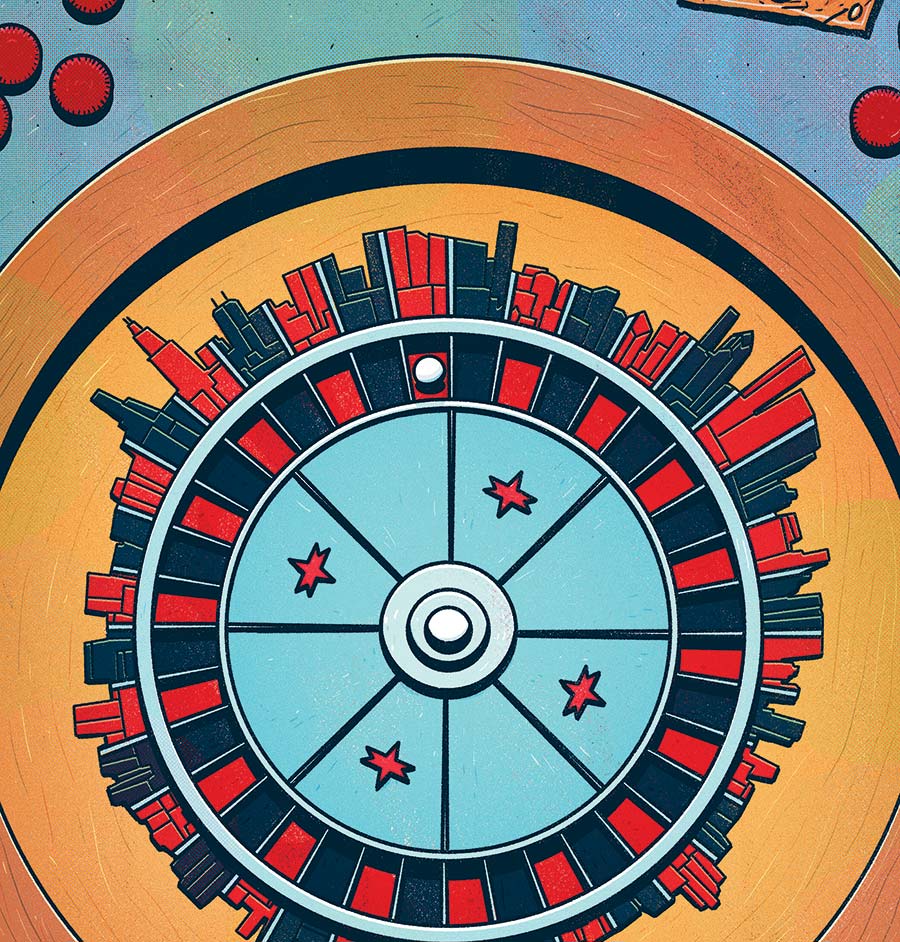
There’s plenty of action at Rivers Casino in suburban Des Plaines on this Wednesday afternoon. Scores of gamblers shovel quarters and dollar bills into banks of garishly colored video terminals with flashing names like Blazing 7’s Blackjack and Ultimate Texas Hold ’Em. Others prefer the high-stakes buzz of table games. “Guess what?” shouts a player to a small stack of pale blue chips as he scoops them up. “I love you!”
It’s surely the type of lively scene Chicago’s business leaders envision, roulette wheels spinning in their eyes, when they push for a casino within city limits. For decades, they’ve lusted for one, only to be repeatedly spurned by state lawmakers. On the surface, it seems like the tide is finally turning in their favor: Governor J.B. Pritzker is hot to expand gambling options statewide — and rake in millions of fresh tax revenues — and Lori Lightfoot and Toni Preckwinkle, the last two mayoral candidates standing, both favor a casino.
So, yes, the odds for a Chicago casino are looking better. But it’s still unlikely. To begin with, the necessary legislation hasn’t gotten much love in the early days of the Pritzker administration. Despite a campaign promise to consider new casinos near the state’s borders that would compete with gambling emporiums in Indiana or Wisconsin, the governor didn’t call for boosting the number in his first budget address.
Right now, Pritzker is focused instead on legalizing sports betting, which was sanctioned last year by the Supreme Court and could open the way for internet-based gambling. The governor estimates sports betting would bring the state a $200 million windfall in annual licensing fees, but it’s also possible it would rattle traditional casinos the same way Amazon is rocking old-line retailers. The casino industry is already struggling to attract younger players as its core baby boomer base ages out. Millennials gamble less often than older folks and increasingly prefer the convenience of smartphones — which could thwart a new casino from the get-go.
“Is the casino’s time over because of the internet? It’s a very good question,” concedes Michael Zalewski, a Democratic state representative from Riverside, who will play a key role in gambling expansion.
The state approved riverboat gaming in 1990 but has since doled out only 10 licenses, including ones in Joliet, Elgin, and Aurora. Last year, all forms of gaming in Illinois racked up combined adjusted gross receipts of $1.3 billion, according to state data. While that’s a lot of money being plowed into video poker machines and table games, state records also show that casino revenues have slowly declined for six straight years.
But the drop-off is not dampening the ardor of the business elite — yet. The Chicagoland Chamber of Commerce has backed a city casino since 1991, and its best-case scenario envisions a betting complex generating up to $950 million annually and creating 2,500 permanent jobs. (The chamber did not respond to emails about its vision for a city casino.)
Then there’s the legislative web that needs to be negotiated. Chicago advocates would prefer a so-called clean bill that authorizes only a city location. But the rest of the state is going to try to get in on the action, too, since any legislation would likely nix the arcane Illinois law that allows casinos only on water. Then the horse-racing industry will push to add slot machines at its tracks. The result could be a “Christmas tree” bill bearing so many varied and competing interests that it eventually collapses.
“Put everything in one bill, and it’s going to be hard to pass,” contends Tom Swoik, executive director of the Illinois Casino Gaming Association, a trade group that opposes a Chicago casino because it believes the metro area is saturated.
Leading the charge in Springfield is Representative Robert Rita, a longtime advocate for casinos, whose 28th District includes parts of West Pullman, Robbins, and Tinley Park. Complicating his quest is the high turnover in the General Assembly, where an estimated 30 percent of lawmakers are new and less steeped in the machinations of state-backed gaming. The most powerful lawmaker in the General Assembly — House speaker Michael Madigan — has recused himself in recent years from all gaming legislation and has “no position on a Chicago casino,” according to his spokesman.
The city’s best shot? Do a little horse-trading, says Cory Aronovitz of the Casino Law Group, which is an authority on gaming legislation. Existing casinos will be less likely to “tank a new bill” that includes a Chicago entry if they’re given a head start on marketing online sports betting, which they see as a lifeline amid their declining revenues.
One of the biggest threats, though, could simply be time. The exact location of a Chicago casino remains another big-money question that won’t quickly be resolved, if one becomes legal. Convention, tourism, and dining interests crave a downtown presence. However, Mayor Rahm Emanuel recently suggested a casino for the Southeast Side’s Illinois International Port District. The location would directly compete with the Horseshoe Casino in Hammond, Indiana, which draws about $40 million in monthly revenues just from players crossing the state border. Not everyone is sold on that strategy. “Getting back the money from Indiana is so myopic,” says Kim Goluska, an urban planner who has assisted the Chicagoland Chamber on casino issues. “The idea is to create a destination anchor in downtown Chicago.”
The longer it takes to resolve these squabbles, the thinner the prime audience will become. And if hordes of younger gamblers flock instead to online games, then all bets are off for Chicago.



Comments are closed.